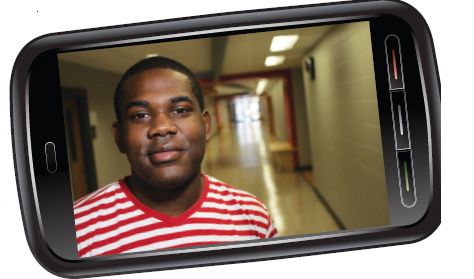Introduction with Student Profile
| 1 | Why Go to College? |
IN THIS CHAPTER YOU WILL EXPLORE
Working twenty-two hours and taking sixteen credits means that I rarely get enough sleep because I have to stay up late studying. So my biggest goal for now is to find a way to better manage my time.
Rontavius Jamal Snipes, 23
Biology major
Clayton State University, Georgia
Setting goals—both long- and short-term goals—has always been important to Rontavius Snipes. After high school, when he found himself living in Atlanta working at a dead-end job, he set his sights on going to college and enrolled at Clayton State. Now that he’s in college, he’s majoring in biology with the goal of attending dental school after graduation, and he knows that getting good grades and staying involved on campus will help him achieve that ultimate goal.
Like many students, Rontavius also needs to balance working (he works at a pharmacy 30 miles from campus) with attending and participating in school, so many of his goals have involved small steps. “I am currently the president of the pre-dental student association,” he explains. “The group is small, but this semester I plan to attend a leadership seminar to get some extra motivation to be able to lead a successful student organization.” He also gets involved on campus in smaller ways by promoting concerts and plays, which helps him stay connected with other students. He acknowledges, however, that working and attending school does have its challenges, ones that he’s still looking for solutions to. “Working twenty-two hours and taking sixteen credits means that I rarely get enough sleep because I have to stay up late studying. Finding a social life away from my roommates and my girlfriend can be difficult too, so my biggest goal for now is to find a way to better manage my time.” Still, Rontavius knows that the hard work will pay off. “Prior to attending college, I never thought about things deeply and took everything at face value. I have a greater intuition now and definitely feel that the price I pay for education is well worth it,” he says.

In the future Rontavius hopes to travel the world tackling issues such as poverty, cultural barriers, and the economic glass ceiling that many people face, and his favorite class so far, Sociology 1101, plays nicely into those goals. “That class pushes my life message,” he says, “that we should try to understand other cultures and not be so closed-minded. I have been the subject of negative stereotypes, and I just love how this class shows how these ways of thinking came about.”
In 1900 fewer than 2 percent of Americans of traditional college age attended college. Today, new technologies and the information explosion are changing the workplace so drastically that to support themselves and their families adequately, most people will need some education beyond high school. College is so important that more than 67 percent of high school graduates (approximately eighteen million students) attend. Because higher education can be essential to your future earning power and your overall well-being, we are committed to providing a set of strategies you can use to do your best.
Rontavius knows how important a college education is to his future economic status, but he also knows that going to college presents him with many learning opportunities that he wouldn’t happen upon any other way. He has already discovered how important it is to think deeply, and he has recognized that he has leadership skills. Rontavius is also encountering challenges, primarily time management, a challenge facing most college students. He has to work and also wants a personal life. Therefore, he wants strategies to help him better manage his limited time and maintain good grades.
This book is designed to help you explore all that higher education has to offer, discover your own strengths, and learn to be a good thinker, but it will also help you deal with common struggles. As you’re settling into your new college routine, we want to welcome you to the challenging and rewarding world of higher education.